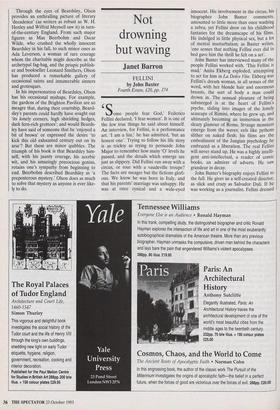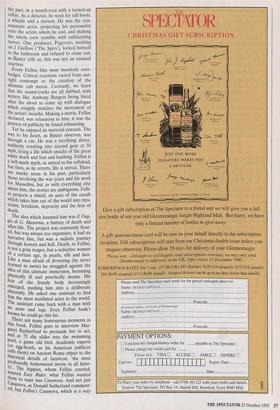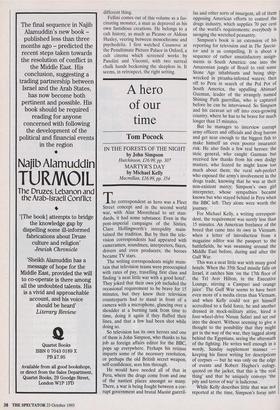Not drowning but waving
Janet Barron
FELLINI Some people fear God,' Federico Fellini declared, 'I fear women'. It is one of the few true things he said about himself. An interview, for Fellini, is a performance art. 'I am a liar,' he has admitted, 'but an honest one'. Trying to follow his life story is as tricksy as trying to persuade John Major to remember how many '0' levels he passed, and the details which emerge are just as slippery. Did Fellini run away with a circus, or tour with a vaudeville troupe? The facts are meagre but the fictions glofi- ous. We know he was born in Italy, and that his parents' marriage was unhappy. He was at once cynical and a wide-eyed
innocent. His involvement in the circus, his biographer John Baxter comments, amounted to little more than once washing a zebra, yet Fellini drew on his childhood fantasies for the dreamscape of his films. He indulged in little physical sex, but a lot of mental masturbation; as Baxter writes, `one senses that nothing Fellini ever did in bed gave him the thrill he felt on a set'.
John Baxter has interviewed many of the people Fellini worked with. 'This Fellini is mad,' Anita Ekberg exploded, attempting to act for him in La Dolce Vita. Ekberg was Fellini's dream woman, in all senses of the word, with her blonde hair and enormous breasts, the sort of body a man could drown in. The sensual pleasure of being submerged is at the heart of Fellini's psyche, sliding into images of the lonely seascape of Rimini, where he grew up, and ultimately becoming an immersion in the sleazy glamour of Rome. Strange monsters emerge from the waves; eels like pythons slither on naked flesh; his films are the embodiment of the Jungian psychology he embraced as a liberation. The real Fellini will never stand up. He was a highly intelli- gent anti-intellectual, a reader of comic books, an admirer of adverts. He saw grandeur in decay.
John Baxter's biography enjoys Fellini to the full. He gives us a self-created director, as slick and crazy as Salvador Dali. If he was working as a journalist, Fellini dressed
the part, in a trench-coat with a turned-up collar. As a director, he went for tall boots, a whistle and a stetson. He was the con- summate actor, projecting his personality onto the actors whom he cast, and making the whole crew tremble with exhilarating nerves. One producer, Pegoraro, working on I Vitelloni (The Spivs'), locked himself in the bathroom and refused to come out; as Baxter tells us, this was not an unusual reaction.
Every Fellini film went massively over- budget. Critical reactions varied from out- right contempt to the creation of the ultimate cult movie. Curiously, we learn that the sound-tracks are all dubbed, with writers like Anthony Burgess being hired after the shoot to come up with dialogue which roughly matches the movement of the actors' mouths. Making a movie, Fellini declared, was relaxation to him; it was the process of publicity he found exhausting. Yet he enjoyed its material rewards. The Way to his heart, as Baxter observes, was through a car. He was a terrifying driver, suddenly crashing into second gear at 50 mph, living a life which smacks of the great white shark and fear and loathing. Fellini is a self-made myth, as unreal as his celluloid, but then, as he retorts, life is unreal. There are murky Ay areas in his past, particularly those involving the war years and his work for Mussolini, but as with everything else about him, the stories are ambiguous. FeIli- ill projects a shield, an aura of the occult which takes him out of the world into mys- ticism, fetishism, depravity and the fear of death.
The idea which haunted him was II Hag- gio di G. Mastorna, a fantasy of death and after-life. The project was constantly float- ed, but was always too expensive; it had no narrative line, but was a sadistic journey through heaven and hell. Death, to Fellini, is not a grim reaper, but a seductive woman of a certain age, in pearls, silk and lace. Like a man afraid of drowning (he never learned to swim) he struggled against the idea of this ultimate immersion, becoming Physically ill and practically insane. His fear of the female body increasingly emerged, pushing him into a deliberate obscenity. He asked one assistant to find him the most mutilated actor in the world. The assistant came back with a man with no arms and legs. Even Fellini hadn't known he could go this far. There are many humourous moments in this book. Fellini goes to interview Mar- garet Rutherford to persuade her to act, and at 75 she slides into the swimming Pool, a game old bird. Academic experts (or egg-heads, as his American publicist calls them) on Ancient Rome object to the historical details of Salyricon, 'the most profoundly homosexual movie in all histo- rY The hippies, whom Fellini courted, wanted Easy Rider: what Fellini wanted them to want was Casanova. And not just Casanova, as Donald Sutherland comment- ed, but Fellini's Casanova, which is a very different thing.
Fellini comes out of this volume as a fas- cinating monster, a man as depraved as his own fastidious creations. He belongs to a cult history, as much as Picasso or Aldous Huxley, veering between monochrome and psychedelia. I first watched Casanova at the Penultimate Picture Palace in Oxford, a cult cinema which screened works by Pasolini and Visconti, with two surreal chalk hands beckoning the sleepless in. It seems, in retrospect, the right setting.




































































 Previous page
Previous page